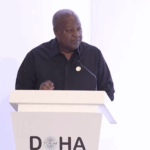
CEO of the Ghana Association of Banks (GAB), John Awuah, says the challenges in Ghana’s lending system reflect the character of the country and deep structural deficiencies that extend far beyond the banks themselves.
Speaking on JoyNews’ PM Express on November 12, he said that comparing Ghana’s lending rates to those in Côte d’Ivoire exposes systemic problems that have nothing to do with banking discipline alone.
He pointed out that many of the banks operating in Ghana also operate in Côte d’Ivoire, yet they lend at much lower rates there.
“Half of the banks operating in Ghana are also operating in Côte d’Ivoire — talk of the Ecobanks, Access Bank and the likes. How is it that in Côte d’Ivoire, the same bank is able to lend at the rate we are talking about?” he asked.
According to him, the difference is not simply about risk or management. It is about the broader systems that support financial operations.
“It’s a character of a country and the structural deficiencies that we have in this country,” he said.
He explained that processes within key state institutions affect how banks function and how credit risk is assessed.
“We have a lot of structural bottlenecks — from the Lands Commission to the court system to credit culture,” he noted.
Mr. Awuah said the absence of a unified credit reporting system makes it difficult for banks to properly assess loan applicants.
“If Mr Joseph Obeng [GUTA president who was also on the show] approaches a bank to borrow, let’s say ¢100,000, all the bank could do is say, Oh, where else do you have exposure? It is word of mouth. There is no mechanism for having a 360 view of the customer,” he explained.
He said borrowers often withhold information about other debts, making it impossible for banks to assess their true financial exposure.
“Whether he has a supplier’s credit, he won’t disclose to the bank. Whether he has taken a loan from the landlord of the property where he rents, whether he is even in arrears, he won’t disclose to the bank,” Mr Awuah said.
This lack of transparency, he warned, distorts lending decisions and increases the risk of loan defaults.
“So the bank gives ¢100,000, thinking it is going to maybe bring goods from China to sell, make money, and pay back the loan.
“Half of it goes to pay the supplier, another half goes to pay rent and salary in arrears. By the time you realise, what you funded is gone. Where is he going to get the money to pay you back?” he said.
Mr Awuah insisted that Ghana’s lending environment cannot be fixed by focusing on banks alone.
The weaknesses, he said, lie in the national systems that define how information flows, how property is verified, and how the courts enforce credit agreements.
“The system that gives the bank a 360 view of the customer is non-existent,” he emphasised.
- President Commissions 36.5 Million Dollars Hospital In The Tain District
- You Will Not Go Free For Killing An Hard Working MP – Akufo-Addo To MP’s Killer
- I Will Lead You To Victory – Ato Forson Assures NDC Supporters
Visit Our Social Media for More




